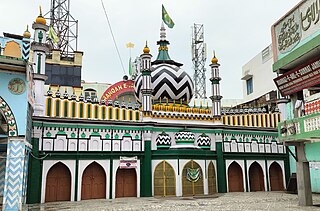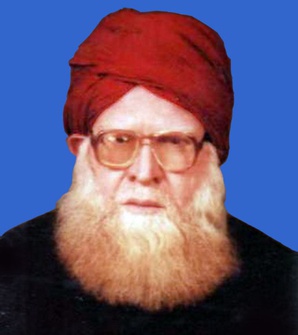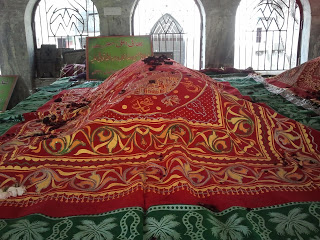
The Barelvi movement, also known as Ahl al-Sunnah wa'l-Jamaah is a Sunni revivalist movement following the Hanafi and Shafi'i schools of jurisprudence, and Maturidi and Ashʿari schools of theology with strong Sufi influences and with hundreds of millions of followers. It is moderate form of Islam that Muslims in south Asia have followed for centuries and it encompasses a variety of Sufi orders, including the Chistis, Qadiris, Soharwardis and Naqshbandis as well as many other orders and sub-orders of Sufism. They consider themselves to be the continuation of Sunni Islamic orthodoxy before the rise of Salafism and Deobandi Movement.

Ahmed Raza Khan Barelvi, known reverentially as Ala Hazrat, was an Indian Islamic scholar, theologian, Mujadid or reviver of Islam jurist, preacher, poet from Bareilly, British India, considered as the founder of the Barelvi movement and the Razvi branch of the Qadri Sufi order.
Usha Sanyal is an Indian scholar and historian of Islam specializing in the Barelvi movement. She was a visiting assistant professor of history at Wingate University in North Carolina.

Madrasa Manzar-e-Islam, also known as Jamia Razvia Manzar-e-Islam, is an Islamic seminary in India. It was founded in 1904 in Bareilly, India by Ahmed Raza Khan Barelvi.

Syed Shuja’at Ali Qadri was the first Grand Mufti of Pakistan, Judge of Federal Shariat Court, a member of the Pakistani Council of Islamic Ideology, and a scholar of Islamic Sciences and modern science. He was influenced by Mustafa Raza Khan Qadri.

Akhundzada Mohammad Abdul Ghafoor Hazarvi was a Muslim theologian, jurist, and scholar of ahadith in Pakistan. He was active in the Pakistan movement, member of Council of Islamic Ideology. He was the companion of Muhammad Ali Jinnah and separatist leader Maulana Zafar Ali Khan and was active in the independence movement of Pakistan against the British Raj. He was a Sufi of the Chishti Sufi order and the founding member of the religious Barelvi Sunni strain political party Jamiat Ulema-e-Pakistan (JUP). He became its president in 1948. He was also a political figure in Pakistan and was the first recipient of Nishan-e-Imtiaz by the President of Pakistan. He was also the chairman of Majlis-e-Tahaffuz-e-Khatme Nabuwwat, an organisation opposed to the Ahmadiyya Movement that waged a campaign against Mirza Ghulam Ahmed's claim of prophethood.

Mustafa Raza Khan Qadri (1892–1981) was an Indian Sunni Muslim scholar and author, and leader of the Sunni Barelvi movement following the death of its founder, his father Ahmed Raza Khan. He was known as Mufti-Azam-i-Hind to his followers. He is widely known as Mufti-e-Azam-e-Hind. On his death date his follower celebrate Urs name as Urs-e-Noori on every 14th Muharram of Islamic Year.

Muhammad Akhtar Raza Khan Azhari, also known as Tajush Shari'ah or Azhari Miya, was an Indian Barelvi Muslim scholar, cleric and mufti. He was the great grandson of Ahmed Raza Khan Barelvi who was considered to be a Mujaddid by his followers and was the founder of the Barelvi movement. He was recognised by Barelvi Muslims as the Grand Mufti of India. He was ranked 22nd on the list of The 500 Most Influential Muslims in the world, compiled by the Royal Islamic Strategic Studies Centre. He had tens of millions of followers in India.

Husamul Haramain or Husam al Harmain Ala Munhir kufr wal mayn 1906, is a treatise written by Ahmad Raza Khan which declared the founders of the Deobandi, Ahle Hadith and Ahmadiyya movements as heretics.
Pir Syed Jamaat Ali Shah was a Pakistani Author, Islamic scholar and Sufi saint of the Naqshbandi Order. He Presided the All India Sunni Conference and leaded the Movement for Shaheed Ganj Mosque. He was a contemp of Ahmed Raza Khan Barelvi, the founder of Barelvi movement.

All India Sunni Conference was an organization of Indian Sunni Muslims associated with Sufism and this Conference became the voice of Barelvi movement in British India. The Conference was established in 1925 in the wake of Congress led secular Indian nationalism, changing Geo-political situation of India by leading Barelvi personalities of that time including Jamaat Ali Shah, Naeem-ud-Deen Muradabadi, Mustafa Raza Khan Qadri, Amjad Ali Aazmi, Abdul Hamid Qadri Badayuni, Mohammad Abdul Ghafoor Hazarvi and Syed Faiz-ul Hassan Shah among others.

ʿAbd al-Ḥāmid al-Qādirī al-Badāyūnī also known as Mujahid-e-Millat was an Indian-Pakistani Islamic scholar, Sufi master, poet, and leader from Pakistan. He was the founder of the Islamic college Jamia-Talimat-e-Islamiya located in Karachi.

The Grand Mufti of India is the most senior and influential religious authority of the Sunni Muslim Community of India. The incumbent is Sheikh Abubakr Ahmad, general secretary of All India Sunni Jamiyyathul Ulama, who was conferred the title in February 2019 at the Gareeb Nawaz Peace Conference held at Ramlila Maidan, New Delhi, organised by the All India Tanzeem Ulama-e-Islam.

Hassan Raza Khan Bareilwi was an Indian islamic scholar, sufi and poet and the younger brother of Imam Ahmed Raza Khan, the main leader of the Ahle Sunnat movement. He was a disciple of Sha Ale Rasool Marehrvi, a Sufi master from Marehra, Etah, Uttar Pradesh. He was a disciple of Dagh Dehlvi, a learned poet from Delhi. Hazarat Mohani praised Hassan Raza Khan's poetry.

The Bibliography of Imam Ahl-e-Sunnat Ahmed Raza Khan Barelvi is a selected list of generally available scholarly resources related to Ahmed Raza Khan Barelvi, the Reviver of Islam in India and founder of Ahl-e-Sunnat Wal Jamaat revival Movement or Barelvi Movement.
Devotional Islam and Politics in British India: Ahmad Riza Khan Barelwi and His Movement, 1870-1920 is a book written by American Historian and Professor Dr. Usha Sanyal about the life of the Founder of Barelvi Movement, Ahmed Raza Khan Barelvi. It was published in 1995 by the Oxford University Press.
This Bibliography of Barelvi Movement is a selected list of generally available scholarly resources related to Barelvi movement, a revivalist movement within Sunni Islam, adhering to the Hanafi school of law, started in the late 19th by the Imam Ahmed Raza Khan Barelvi in British India.

Eid-ul-Milad-un-Nabi or normally called Eid Milad-un-Nabi or Barawafat is a festival of Mawlid celebrated by Sunni Muslims across India, Pakistan and Bangladesh. It is organised on the birth anniversary of the Islamic Prophet Muhammad on the date of 12 Rabi Ul Awwal per Islamic calender. During the festival a procession is also taken in the name of Juloos-e-Muhammadi after the festival of Milad. It is considered as a holiday in whole India, Pakistan and Bangladesh.
Hizbul Ahnaf also known as Dar-ul-Uloom Hizb-ul-Ahnaf or Madrasa-e-Hizbul Ahnaf is an Islamic Educational seminary founded by Syed Deedar Ali Shah Alwari, a student of Ahmed Raza Khan Barelvi and Khatib of Masjid Wazeer Khan in 1924 at Lahore. It is affiliated to the Barelvi movement of Sunni Islam. It was established under the Hizb ul Ahnaf-e-Hind, established in 1910s and inaugurated by Ahmed Raza Khan Barelvi.










